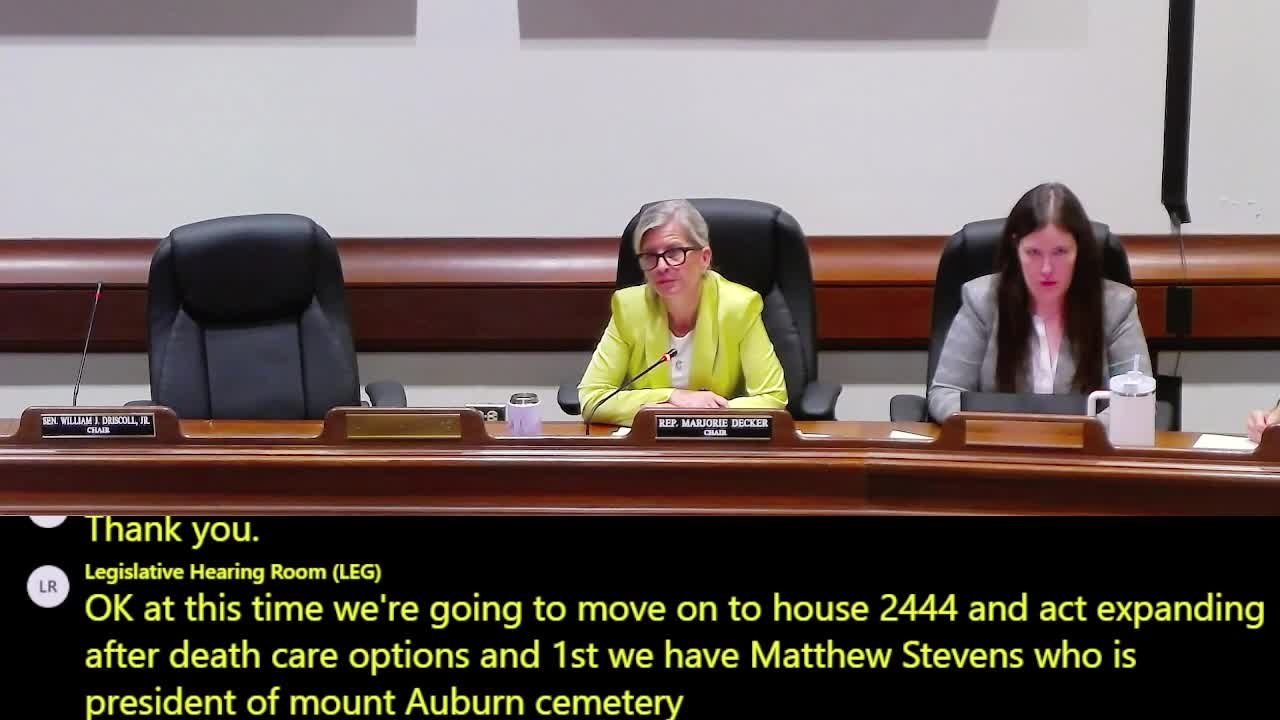Cemetery and consumer groups back legalizing natural organic reduction and alkaline hydrolysis; industry warns on crematory ownership changes
September 29, 2025 | 2025 Legislature MA, Massachusetts
This article was created by AI summarizing key points discussed. AI makes mistakes, so for full details and context, please refer to the video of the full meeting. Please report any errors so we can fix them. Report an error »

Supporters of expanding after‑death care options told the Joint Committee on Public Health that Massachusetts should add natural organic reduction (human composting) and alkaline hydrolysis as legal disposition options and establish rules for facilities that perform those services.
Matthew Stevens, president and CEO of Mount Auburn Cemetery, told the committee that organic reduction and alkaline hydrolysis “are considered a more environmentally friendly alternative to traditional cremation” and called for a delayed effective date to allow regulators and cemeteries to prepare standards and frameworks.
Patty Muldoon, president of the Funeral Consumers Alliance of Eastern Massachusetts, urged the committee to “expand residents’ choice by legalizing human body disposition options of natural organic reduction and alkaline hydrolysis,” citing climate and space concerns in urban cemeteries and saying the options are in demand.
Cemetery groups opposed a separate bill (H2360) that would allow funeral establishments to operate crematories. Guy Glotis, legislative agent for the Massachusetts Cemetery Association, said Chapter 114 currently assigns disposition responsibility to cemeteries and warned that letting funeral homes run crematories could introduce competition that jeopardizes nonprofit cemetery sustainability and long‑term recordkeeping.
Speakers also supported eliminating medical examiner fees for the removal of a body of a child age 5 or under (bill referenced in testimony). Funeral directors and legislators characterized charging grieving families for certain medical examiner reviews as unfair and urged relief for the most vulnerable families.
The committee took testimony from advocates, industry representatives and public health professionals and did not vote. Witnesses asked the committee to report favorable on bills to legalize new disposition methods and to consider safeguards for cemetery operations, consumer protection and cemetery sustainability.
Matthew Stevens, president and CEO of Mount Auburn Cemetery, told the committee that organic reduction and alkaline hydrolysis “are considered a more environmentally friendly alternative to traditional cremation” and called for a delayed effective date to allow regulators and cemeteries to prepare standards and frameworks.
Patty Muldoon, president of the Funeral Consumers Alliance of Eastern Massachusetts, urged the committee to “expand residents’ choice by legalizing human body disposition options of natural organic reduction and alkaline hydrolysis,” citing climate and space concerns in urban cemeteries and saying the options are in demand.
Cemetery groups opposed a separate bill (H2360) that would allow funeral establishments to operate crematories. Guy Glotis, legislative agent for the Massachusetts Cemetery Association, said Chapter 114 currently assigns disposition responsibility to cemeteries and warned that letting funeral homes run crematories could introduce competition that jeopardizes nonprofit cemetery sustainability and long‑term recordkeeping.
Speakers also supported eliminating medical examiner fees for the removal of a body of a child age 5 or under (bill referenced in testimony). Funeral directors and legislators characterized charging grieving families for certain medical examiner reviews as unfair and urged relief for the most vulnerable families.
The committee took testimony from advocates, industry representatives and public health professionals and did not vote. Witnesses asked the committee to report favorable on bills to legalize new disposition methods and to consider safeguards for cemetery operations, consumer protection and cemetery sustainability.
View full meeting
This article is based on a recent meeting—watch the full video and explore the complete transcript for deeper insights into the discussion.
View full meeting
